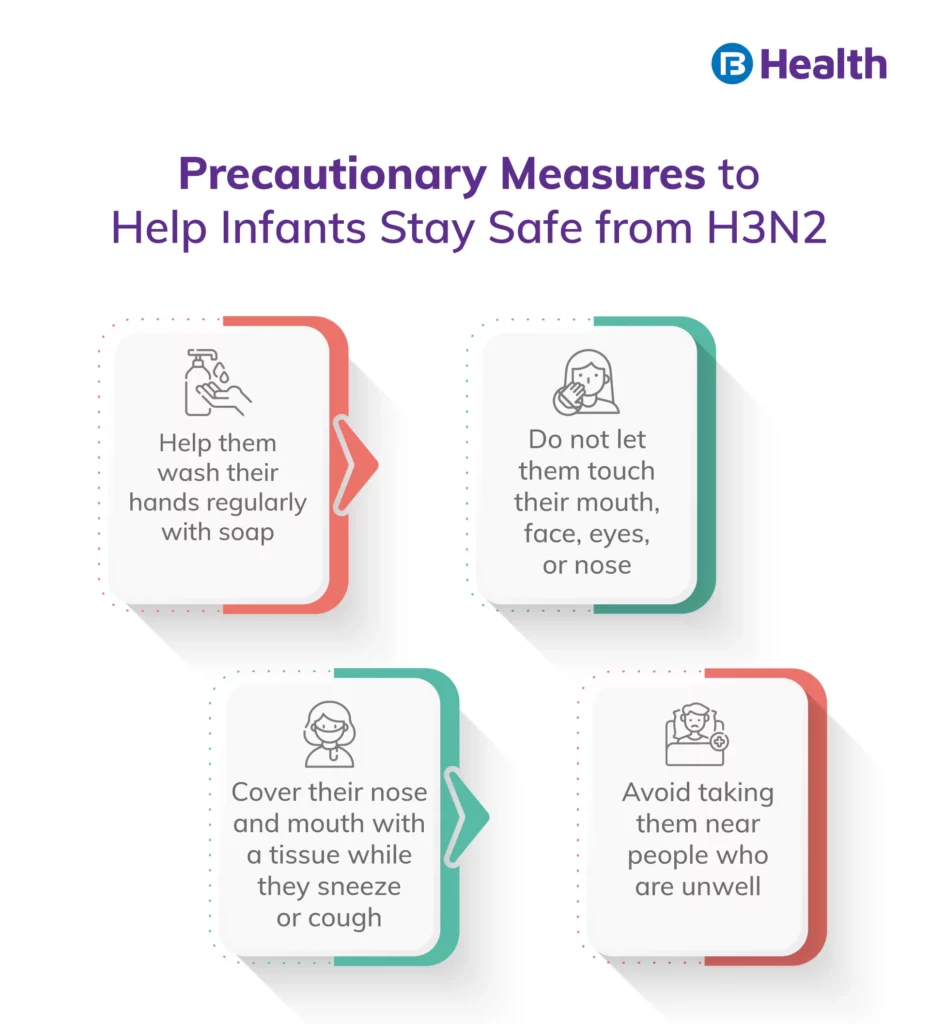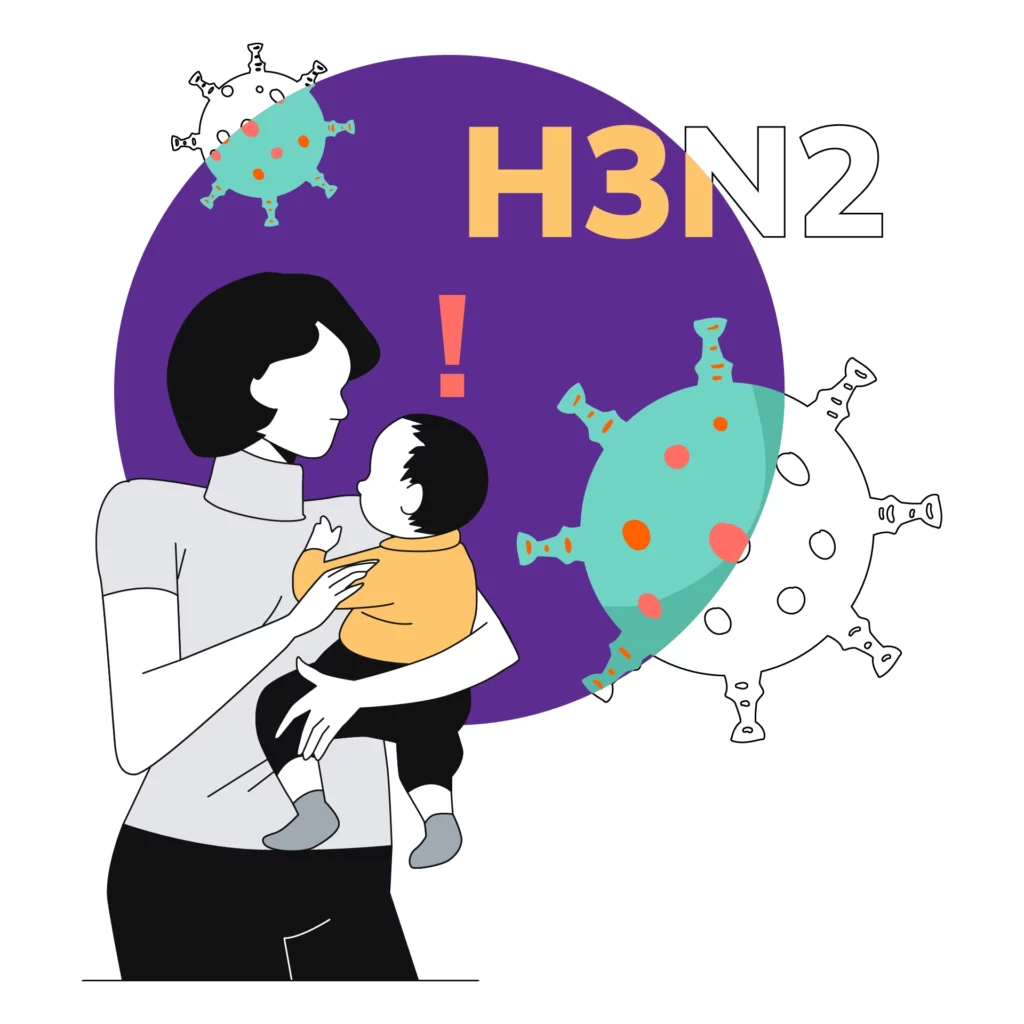Paediatrician | 5 min read
H3N2 in Infants: Are Children at a High Risk?
Medically reviewed by
Table of Content
Synopsis
In March 2023, Pune reported a sharp increase in the number of children infected by the H3N2 Influenza admitted to the ICU. This incident has led to speculations about whether children are more prone to post-H3N2 complications than adults. Read on to find out.
Key Takeaways
- The common symptoms of H3N2 infection are runny nose, cough and fever
- H3N2 can affect children as well as adults of any age
- It is wise to introduce your children to personal protective measures
Recently, H3N2 infection, caused by a subtype of Influenza A virus, has emerged worldwide. Though the virus can affect people of any age, rising cases of H3N2 in infants are becoming a cause of concern. Are children at a high risk of getting severe complications from H3N2 flu? Read on to find out.
H3N2 in Infants: An Overview
In March 2023, hospitals in India saw a huge spike in the number of patients getting admitted with the H3N2 infection. They include a large number of children under the age of 5, as well as the elderly. Doctors and other healthcare professionals are taking every measure to curb the H3N2 spread at the earliest, just like they did during the pandemic.
The precautions they are advising to prevent the H3N2 flu virus are also similar to those of COVID-19. In the last few days, Pune has reported a sharp increase in the number of children infected by the H3N2 Influenza admitted to the ICU. On the other hand, the situation is a bit different in Delhi as here, H3N2 flu symptoms are getting more visible among the elderly.
H3N2 in Infants: Are They at Higher Risk
Though there are no reports of infant deaths from H3N2 in India, it can lead to severe complications. In the United States, 13 children have already succumbed to the flu this season, as per reports.
Centers for Disease Control and Prevention (CDC), a national health authority in the US, has stated that children under the age of five are quite likely to develop complications from H3N2 infection [1]. This is because their lungs and immune system are in the developing phase. Especially infants with existing conditions such as neuro disorders, diabetes, or asthma are at high risk.
Additional Read: H3N2 Influenza Symptoms
What Are the Latest Developments in Spread in India?
In Pune, there has been a significant rise in the number of children getting admitted to intensive care units with severe H3N2 flu symptoms. As per reports, most of these children are below five, and usual medications such as antibiotics are not working for them.
What Are the Symptoms of H3N2 in Kids?
The symptoms of H3N2 in infants and adults are quite similar to those of flu or COVID-19. If the virus invades your body, you may experience the following:
- Body ache
- Runny nose
- Fever
- Chills
- Sore throat
- Coughs
- Vomiting
- Nausea
- Diarrhoea
In mild infections, these symptoms may last for around three days and then will gradually diminish. However, it is important to consult a doctor if they don’t go away and bring other complications such as breathing difficulty.
Usually, the H3N2 virus gets transmitted through droplets emitted in the air by infected individuals. For example, these droplets are released when infected people sneeze, cough, or speak. Moreover, this infection can also spread from contaminated surfaces or food. In such cases, it enters the human body when healthy individuals touch their nose, face, eyes or mouth after being in contact with the contaminated surface or object. However, the mode of transmission is limited to person-to-person, and no community spreading of the H3N2 virus has been identified so far.
What is the Treatment for H3N2?
In cases of H3N2 Influenza in infants or adults, taking sufficient rest is crucial for a quick recovery. Doctors also ask to drink lots of fluids to maintain hydration. Following the guidelines of WHO, they may also recommend neuraminidase inhibitors (antiviral medications) such as oseltamivir and zanamivir in suspected as well as confirmed cases. As per the guidelines, they should be given within two days after symptoms occur to leverage all their therapeutic benefits.
Apart from these, doctors may prescribe OTC painkillers such as acetaminophen and ibuprofen to lessen the agony of patients.
Additional Read: Viral Fever Symptoms
Precautions
For parents, it is crucial to introduce children to personal protective measures to prevent H3N2 transmission. Here are the things about which you must train your child:
- Keeping their hands clean by washing them with soap or applying sanitizer
- Prevent them from touching their mouth, face, eyes, or nose
- Maintaining respiratory hygiene by wearing a mask or covering their nose and mouth with a tissue while they sneeze or cough
- Isolating them if they start experiencing H3N2 symptoms
- Avoiding close proximity to people who are unwell [2]
With all this information about H3N2 in infants at your disposal, keeping your child safe from the contagious H3N2 Influenza becomes easier. However, note that not only your child but also other members of your family need to follow the precautionary measures to stop H3N2 spread.
If you or any other member of your family still start experiencing H3N2 flu symptoms, you can book a quick online doctor consultation on Bajaj Finserv Health. Choose from the doctors based on their experience and degree, as well as the languages they speak.
Apart from online consultation, you can also book an in-clinic visit through the platform, as it is more convenient in severe cases of H3N2 in infants. Get all your concerns resolved in minutes and start your journey towards wellness in no time!
References
- https://www.cdc.gov/flu/swineflu/h3n2v-situation.htm
- https://www.who.int/news-room/fact-sheets/detail/influenza-(avian-and-other-zoonotic)?gclid=CjwKCAjw_MqgBhAGEiwAnYOAerI68T5hLF0P26hnfWxrKcjbhT7d3kbPYh6Pe6DWOj9JCcWILeVeRxoCBkgQAvD_BwE
Disclaimer
Please note that this article is solely meant for informational purposes and Bajaj Finserv Health Limited (“BFHL”) does not shoulder any responsibility of the views/advice/information expressed/given by the writer/reviewer/originator. This article should not be considered as a substitute for any medical advice, diagnosis or treatment. Always consult with your trusted physician/qualified healthcare professional to evaluate your medical condition. The above article has been reviewed by a qualified doctor and BFHL is not responsible for any damages for any information or services provided by any third party.





